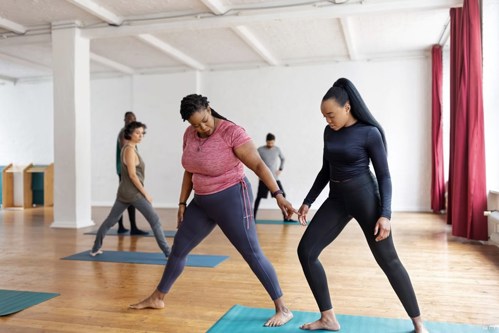Best Time to Walk: Benefits of Morning, Midday, and Evening Strolls - By Daniella Gray

SIGN UP FOR YOUR FREE DAY PASS TODAY!
As we enjoy the last few days of summer, our thoughts start to turn to new routines – but not all of us are keen on a hard September reset. Here are four ways to ensure you make your habits stick.
Even if you haven’t jetted off anywhere this summer, the arrival of autumn heralds a new start approach.
There’s something about September that feels like a beginning, and it can be tempting to go all-in on a new fitness regime and develop some new habits before the inevitable Christmas break.
But just because we can do something, it doesn’t always mean that we should – and this particularly applies to going headfirst into a hardcore exercise routine that feels unsustainable and overly challenging.
So, if you’re keen to make some changes this month but aren’t sure where to start, here are four tips to do so in a gentle, sustainable way.
Start small and change one thing

It’s easy to get carried away when we think about starting a new exercise kick or when we’re returning to working out after a break.
But going too hard too fast can – and likely will – lead to burnout. If you’re trying to overhaul your sleep, diet, fitness, stress levels, and more all at once (and we get it, we’re constantly being told to), you’re likely to feel overwhelmed and as though you’re failing a few days or even weeks in.
“As a specialist women’s health and fitness coach, I wouldn’t recommend signing up to the latest fitness and diet trends on social media,” says trainer Mari-Carmen Sanchez-Morris. “Often these fitness resets/trends are unsustainable and highly restrictive. Instead, choose an exercise discipline you enjoy and start small.”
We’re talking about increasing your daily step count (if walking is your thing), or trying a 20-minute strength class a couple of times a week, and building from there.
The key here is to change one thing at a time.
“Habits can take anywhere from 21 days or more to establish,” explains trainer Beth Davies, “so start by building up gym visits or home workouts. Or start by having protein at each meal or eating more veg – just don’t do it all at once.”
And remember: it’s about progress over perfection.
“In his book Atomic Habits, James Clear talks about aiming to improve by only 1% each day,” notes Kirsten Whitehouse, trainer and founder of Wolf Approach Fitness. “Small changes may not be noticeable immediately – this is what makes them attainable and sustainable – but they soon add up to lasting improvement.”
Follow your heart
We’ve said it before, and we’ll say it again: find movement that you enjoy and makes your heart sing, and you’ll keep coming back for more. Who wants to set their alarm for 6 a.m. to do something they hate?
“Find an exercise or a way of eating that you enjoy and can see yourself doing for the long term,” agrees Davies. “If food and exercise is a means to an end, you may see short-term results but find them difficult to maintain.”
Think about the reasons you want to make a change – ensuring your regime is aligned with your values will make it easier and more intuitive to stick to.
Be kind to yourself
Let’s face it, life is hectic. And some days, even the most committed of us can’t find a way to make things work. We’re grabbing food on the run or chilling on the sofa rather than hitting the gym – and we’re here to tell you, that is totally fine.
“Know that some days or weeks these new habits might feel hard and that’s OK,” stresses Davies. “What can feel like a backward step isn’t really – be kind to yourself.”
There’s one thing an all-or-nothing mindset achieves – and that’s feeling you’ve failed.
“Clients who want a hard and fast approach tend to have a 100% compliance rate for a few weeks but sooner or later they will miss a workout or want to have a drink or pizza – it’s only natural and it’s totally OK.
“Sadly, the ‘all or nothing’ client doesn’t see it this way and the 100% perfection can quickly turn into a feeling of 100% failure. This results in disillusion and clients quickly stop their well-being journey.”
Seek expert advice and support

Even the most committed, knowledgeable exerciser can reap benefits from some expert advice every now and again. This might be trying a new discipline (think switching from HIIT to barre) or working with a nutritionist to ensure you’re meeting your food needs.
“Work with a coach or trainer whose approach to exercise and eating well feels sustainable and is backed by good education and experience,” advises Davies. “This is especially important if you are coming from a place where you haven’t been exercising or eating well because your life isn’t yet set up to meet these new habits.”
Everyone needs a little help and guidance along the way, and it’s important to keep in mind that health and fitness aren’t just about what we eat and how much we work out.
“A coach can help you to look after your mindset and mental wellbeing alongside your physical health,” agrees Whitehouse. “The aim is to focus on stress levels, eat for health, and get enough sleep.”
Source:stylist.co.uk
The opinions shared in the GymNation blog articles are solely those of the respective authors and may not represent the perspectives of GymNation or any member of the GymNation team.














